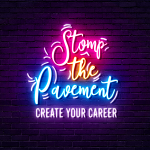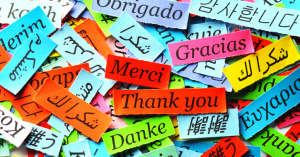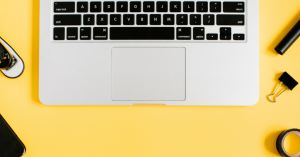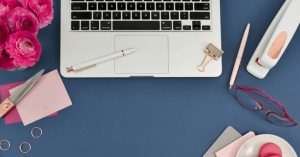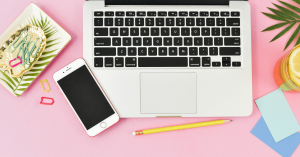Did the 2016 election of Donald Trump completely change your relationship to politics? You’re not alone. Award winning journalist and author Lauren Duca has researched the political awakening that’s happened the past few years, especially in young people, and has created an important guide to continuing it.
In her powerful new book, How to Start a Revolution, she documents this awakening and shows how we can sustain our newfound sense of political agency beyond Trump. It’s a roadmap to finding your political voice and using it to create lasting change.
Lauren Duca and I chatted on the phone to talk about her career, vision for a revolution, and thoughts on how we can turn the U.S. into a real democracy.
Her work is powerful and necessary, so I’m beyond excited to share our conversation and invite YOU to join the revolution!
My interview with Lauren Duca has been edited for length and clarity.
Career
Olivia: Could you just give a quick overview of your career journey before you published How to Start a Revolution?
Lauren Duca: Yes! I graduated from Fordham in 2013, was working as an intern at New York Magazine, and got offered a fellowship on the celebrity vertical of the Huffington Post.
And I remember thinking, “This is so silly,” “I’m not going to be able to be taken seriously as a journalist,” and “This is just an awful way to get started writing.”
But, it was the name of a publication that was well known and my parents were impressed by the offer, so I thought, “How can I make the best of this?”
So, from very early on, I was trying to figure out ways I could use the space I’d been given to do the kind of work I wanted to do. I ended up being able to get a lot of really awesome stuff done.
At the time, HuffPost Celebrity was possibly responsible for the term ‘sideboob.’ As in, they were actually publishing slideshows that would capture female celebrities cleavage from the side. Like, quite literally side boob.
So, it was a challenge to say “How can I do smart, intelligent work in this space?”
What I ended up doing is using the figures of pop culture as a way to breakdown feminism– which was my pressing focus in the most traditional sense of gender equality.
I now understand feminism as a wider intersectional equality, but this was in terms of just gender parity and the oppression of women we see in entertainment.
It was this way of looking at feminist theory through the lens of the biggest players at the time, so it was like Kim Kardashian, Miley Cyrus, Taylor Swift, Nicki Minaj. It was this interrogation of what does the male gaze mean, how can we be empowered in capitalizing on it, is that possible, how are different kinds of bodies policed, and what are the ways in which we can look at how women are held back based on the performances of our idols?
It ended up making me realize the stuff we are all naturally experts in is a really good space to talk about the hierarchies of power that define our lives.
So we, especially young women, are experts in pop culture. It’s harder to reach the average person with in depth theory about equality, but if you use these things that everyone is an expert in, then it quickly becomes a very simple thing to communicate.
It really laid the foundation for the kind of thing I’m doing now, which is making politics accessible and entertaining.
At the Huffington Post, I was also doing longer form pieces, reporting on, for example, how the Lifetime Movie Network decided to make TV for women and how that looks like it was cooked up in a lab.
Also, a piece on the archetype of the woman-child- which I won the L.A. Press Club award for- about how a woman in her 20s or 30s, in between jobs and love and lost in life, is seen as this sort of tragic figure on some level. There’s a current of darkness and sadness in that, whereas the male counterpart is endearing and hilarious.
Basically, overall, I was doing this work that was gearing me toward becoming what I call a “Pop Culture Anthropologist.” I was interrogating these hierarchies of the culture through the lens of entertainment.
Then, I went freelance- HuffPost was a toxic environment and I was happy to leave. I was freelance for about a year before the 2016 election.
When the 2016 election happened, I woke up to this political awakening and no longer understood how to write about anything other than politics.
I actually had this list of features I mention in the book, one of them was a feature on sleep and how it has been turned into a product. I thought, “Well, I’m awake now, so I really can’t write about sleep. I need to figure out how to use my greatest and only skill to make sense of this dumpster fire.”
So, I wrote the book proposal that became the book you see now!
Olivia: That’s amazing! I feel like so many people in their 20s are dissatisfied with their jobs and you sort of said, “Okay, I have it for now, what can I do to put myself into this?” And I think that’s really cool and a good way to create what you want from your career.
Lauren Duca: It’s also, I think, in the HuffPost newsroom, something I learned is that authority is often an illusion.
For example, when I was working there, Amanda Bynes was going through this very public meltdown; it was very difficult to watch and the coverage of it had no humanity whatsoever.
It’s basically this loophole of entertainment writing whereby someone being a celebrity means their trash can be thrown around to the delighted horror of the public.
And the reality is that’s not newsworthy or necessary for the polity making decisions about how to spend their time and energy.
At the time I was writing these op-eds, I developed a column at HuffPost doing those interrogations into pop stars and feminism and it was called Middlebrow.
So they asked me, at HuffPost, “Will you contribute to our policy for how we cover mental health among celebrities?”
I remember it just hit me in this totally new way that all of the rules of journalism are human decisions. I was so struck by it, being asked myself.
I suppose I could have told you that- I suppose I had the basic understanding of it- but being the actual person being asked to express clearly why it must be the case that we would have to have compassion for a celebrity going through what Amanda Byes was going through really struck me with what is possible.
At the heart of journalism is ethical, specific decisions that are being made around the guiding aim of ultimate allegiance to truth and empowering the public with information.
But if you actually look at how things are done or what is allowed or what’s possible, there’s a lot of room for experimentation and growth. It’s another way we are trained to accept the status quo when we’re young and being offered a job, but often the most exciting work comes out when you’re taking risks and innovating.
Olivia: Was publishing a book always part of any plan you saw for yourself? Did you ever have a plan, then things went haywire?
Lauren Duca: So I always, always, always wanted to write and always, always fantasized about writing a book, but I don’t think I had any real understanding of what it was going to mean to be a writer or even what the book was going to be.
I guess the path to getting here, How to Start a Revolution, begins with Fordham.
When I got to Fordham, I started writing for the paper- that’s actually the name of the alternative paper, it’s called “the paper.”
I found my voice through these op-eds about my own experiences on campus and basically finding my way to feminism and interrogating the earliest stages of the things I’m still interested in now.
From those experiences, I said okay I want to write things that are true and, ya know, found my way through the career journey I just depicted, and then had this awakening moment on November 9th [2016].
At that point, when I put together this proposal, it felt as if it was everything I was good at and everything I cared about combined into one thing.
I was then completely and totally overwhelmed by having the opportunity to pursue that.
My skills at that point and well through the first year of working on the book were short form. I would be able to write a pretty clean, publishable op-ed if you gave me a cup of coffee and a half an hour.
It’s a lot like a master sprinter being like, “Can I run the marathon, can I run the marathon, can I run the marathon?” and then they’re like, “Yeah you can run the marathon” and I was like oh shoot.
It’s so extraordinarily hard. I, for a very long time, wrote a lot of shiny shits I thought were going to add up to a book.
I had to give in to the flow and the process of finding all my pieces of research and reporting, letting them speak to each other, letting everything breathe and grow, and being able to click and crystallize to become a cohesive whole.
For a while, I had so much research under my belt I didn’t understand how it was all going to be a book. So, it just sort of seemed like look at all this stuff! It was sort of like a Jackson Pollock- I didn’t quite get how it was all going to smudge together and I had to have a major click moment to see it clearly.
It was terrifically painful for someone who was anxious as fuck, waking up, and being terrified because I was supposed to write this book and I have no idea how.
I think now I would definitely like to write another book, and the way I’ll do it is by being less anxious about expecting the big thread to reveal itself and enjoy the experience of going on the journey.
Olivia: It must be a moment of relief- the marathon over- and you can just enjoy having it and getting to talk about it and having it be part of your life now.
Lauren Duca: Yeah, you know finishing the first draft of it was a really pivotal moment for me personally, because I was in such a state of anxiety over the book for so long. I had done all of this other self exploration and self healing, and I still had this horrible, grinding anxiety. I thought, “Well as soon as I finish this book it will be fixed.”
I felt like I had this blackhole in my chest and I could just put a book in it and be okay. Then, I finished the first draft, and I was actually very proud of the first draft. My inner perfectionist even had to admit what I had done was pretty good, and I still felt overwhelmed by anxiety.
The afternoon I sent my editor my first draft, my brain was still wandering around and asking “What’s next?” after the greatest accomplishment of my life was finished in a major stage.
That actually pushed me to do way more extreme work on myself, get more healing, more in touch with who I am, and find a solid sense of self that does not require an accomplishment like a book to be proof I deserve to be alive.
How to Start a Revolution by Lauren Duca
Olivia: Can you give a quick summary of the book for people who haven’t heard of it?
Lauren Duca: Yeah, so How to Start a Revolution is a journalistic snapshot of the post Trump political awakening, from passively navigating a broken system to actively seeking to change it. I think the way we create true democracy and equitable public power is by bringing millions of young people into the political process, and that is already underway.
I document it with cultural research, outstanding examples, and armed with a call to action that seeks to sustain this shift into a culture of constant resistance and civic action that is embedded into our lives as a daily discipline. Because democracy is not a thing we have, it’s a thing we do.
Olivia: Everything feels very urgent right now, especially because there’s just news happening all the time.
I try to remember what it was like when I wasn’t constantly figuring out the news everyday and worrying about it- so how do you think we can continue the political awakening moment post Trump, once all of this feels less urgent? And for when people who are too young to know what’s going on now, become the age we are when we’re all having our moments- assuming there’s not another Trump in like 10 years?
Lauren Duca: Totally. We need a sustainable culture of democracy, not only to oust trump but to endure well past our next president and, ideally, in perpetuity.
I think what it looks like is creating a daily discipline. I would argue that being a good person and being a good citizen are the same thing, and we all have a duty to the collective and a personal interest in truly being free.
True democracy and equality looks like having a public in which each and every individual person is on equal political footing and acting as a constant active citizen. So what that looks like for the individual is…
Step 1 is always register to vote, vote vote vote vote vote, everyone vote. Definitely vote, 100% vote, but beyond voting it has to be these habits of making your voice heard.
What that means is kind of limitless- you can contact elected officials, you can join a local protest or organize one of your own, you can volunteer or- maybe at a higher level of involvement- you’re starting your own non profit or running for office.
What are the issues you care about the most, ideally at the local level? What are the ways you think the world can be improved, ideally in terms of your immediate community, and how can you be a part of making that change happen?
It’s going to be different for everyone, in the same way that a workout regimen would be different for everyone.
You know, if you decided you were going to start and get fit, you would pick the kind of workout that is best for you and your body and your schedule. Then you would find a way to do it as much as you could. Sometimes you’d skip it and sometimes it sucks, but you make a commitment to be flexing those muscles all the time.
I think that we all have the duty. I would also say it’s not too late. I’m someone who only got awake after Donald Trump’s election. The core of so much of How to Start a Revolution is about the forces of alienation that have made it so the majority of the public seems apathetic.
It’s easy to scapegoat young people and say we just don’t care. Our voices are so actively suppressed by this system that is run by money interests and a geographically biased electoral system and gerrymandering and voter suppression and all of these other majorly overwhelming problems that any individual person is right to feel too small to overhaul on their own.
But we need individual action to add up to collective impact to make the shift into the public power we’ve been denied. I think that requires this commitment in a way that each of us promises to ourselves can be sustainable.
Olivia: I thought about Hamilton the musical a lot while I was reading your book, partially because I listen to the music literally all the time, but also I feel like when that got really big, it was one of the more recent national conversations we’ve had about about the idea of “revolution.” Because the music is very much about the public ideals of revolution surrounding the Revolutionary War.
I obviously can’t imagine a modern revolution would look similar to the one in Hamilton, so I’m wondering what you think a modern revolution would look like?
Lauren Duca: I think a real, modern revolution looks like challenging the reality in which a few people and corporations hold the majority of wealth and power in this nation, by insisting on individual political agency and getting millions of young people involved in the political process, thereby transforming the system over time.
I think it’s a revolution in our relationship to politics and a revolution toward true self determination and individual agency. It’s about insisting on a right and duty to the political conversation. I think the word revolution has been stigmatized, but what it means is an overthrow of the presiding system of power.
To me, it means overthrowing a status quo in which we expect a lack of policy solutions as just the way things are. It means we insist on having voices that have an impact, add up to true change, and create true solutions for the problems the majority of the country would like to see progress on.
The thing is, the way our government currently functions has the majority of the public lulled into believing that not being able to achieve the solutions for healthcare, climate crisis, gun reform- to name a few things that have a majority support in terms of need for a solution- is an acceptable outcome of the way that government functions.
This is a revolution about rejecting that and saying actually what we need is a government that is by and for the people and would allow every voice that is affected by policy to weigh in on the shaping of that policy at all levels of the process.
Olivia: I feel like so many people, when you talk about young people in politics, say, “well you know not enough young people are voting in off year elections.” I love that your book flips it on its head by saying, “Why aren’t you doing enough to get them involved?”
Lauren Duca: And also it’s just such a scam, there’s absolutely no outreach to the majority of the electorate in that most of our elected officials are operating to duplicate the situation that got them elected in the first place. They’re not actually holding themselves accountable to the full range of constituents they represent.
I think it should be those elected officials’ duty to bring as many people as possible, including young people, into the fold.
What you actually see with young people is we’re treated as second class citizens- on top of the way the average person is not invited in- young people are actively boxed out and told we don’t have the experience yet, we’re too naive, we can’t possibly know enough to get involved.
I think there’s this total stigma around youths that’s used to keep us out, on top of a system that’s already deliberately anti democratic.
Olivia: Your book talks a lot about the gatekeeping involved in politics.The line that really stuck out to me near the end was “that’s the way things are, because they said so.”
That reminded me of the gatekeeping that happens in workplaces, especially when you look at the rules of professionalism and who created them, the power wealthy companies have over their employees, and the rules of getting and keeping a job. I was wondering if you see a way for the ideas in How to Start a Revolution can be brought into the workplace?
Lauren Duca: Absolutely. I think that the crux of the ideas in How to Start a Revolution should be applied to all aspects of your life.
We should always be questioning who makes the rules, because we’re hard wired with this script of the white supremencist capitalist patriarchy, and it teaches us to silence ourselves in ways we don’t even realize.
I mean I heard so many young women I spoke to for this book, who clicked into agency, tell me they didn’t feel ready before. They thought that they had to wait until they had more experience or until they were 45 with 2 kids and a dog.
The way a glide path to success is set up for any given white man is not reflected for any other marginalized group. We go along with the basic societal patterns that make it so a man in a suit in the political arena, the professional arena, and whatever setting the man in the suit is automatically taken more seriously than anyone else.
And you don’t even know what’s going on in the man in the suit’s head. He could have a rotting brain. But just the aesthetics of that brings this sense of respectability.
There are these very stealthy ways it is enforced that are difficult to question and not as obvious as we expect sexism or racism to be. So, I would say, if anything feels fishy to you, if it feels like it smacks of racism or sexism in the workplace, then interrogate it and ask questions and talk to your peers about it and always be asking “who decided?”
My favorite example I go to time and again is “who decided that golf is so serious?” Because we think about golf as this respectable, professional hobby, and the only reason that’s the case is because it’s a thing old white dudes like.
There’s a lot of other stuff that’s just in the water and keeps young women from the political conversation, but also from positions of authority in businesses. It makes it so, a lot of times, we don’t even need to be boxed down by the sexist villains of the world, because we’re busy self censoring.
Tips to get Involved in Politics
Olivia: In the book, you talk about the importance of local politics, and they’re definitely incredibly important, but they’re not as “trendy” or zesty as federal politics and it’s hard to get more information about local politics because they’re not in every headline.
Also, politics is this scary, intimidating idea to people, so then throwing in the more minute aspects of local politics feels like it’s difficult. What advice would you give to people who feel intimidated by politics, including the local and state aspects?
Lauren Duca: I would say zero in on your one thing. The reason I suggest local politics is because it’s the place where you’re going to have the greatest impact. It’s going to be easiest to build that out in the community with the people you know and to affect real, actionable shifts you can see.
But maybe it’s an issue that you’re obsessed with, like climate crisis, gun reform, or reproductive rights- what are you going to focus on? Pick that and then become an expert in it.
I would say please relieve yourself of the feeling you must know everything that’s going on in “politics” at all times, because no one does– even the people whose jobs it is don’t, because it’s impossible.
In crafting a democratic ritual, you’re going to have to be mindful and specific about your time and energy, but know we have the greatest tool of information in human history at our fingertips. It’s never been so easy to just look something up.
So, sit down for an hour and begin studying what you need to know about, for example, your local town hall or city council or what avenue you should best pursue to address the problem you have in mind or to get all of your receipts on the specific policy issue you’re interested in.
Become an expert in the 1 thing you care about: focus on that and make it your duty.
And it can change, but figure out how to be economical with your attention and always empower yourself with more information, because that strong foundation is the basis you need to develop the kind of conviction of political opinion that leads to action.
I think a big part of alienation is that politics is so intimidating and it seems like there is so much to know.
What I would say is, every single person has the skills it takes to go out and empower themselves with information and build that foundation of fact that has to underline civic action. The only requirement for taking action should be being informed. So, it’s going to take work, but please do it!
Olivia: So, in terms of the democratic rituals and the things you should do everyday, what do you suggest for young adults and people in their 20s who don’t feel like they have the time in their schedule to do it?
Lauren Duca: I would say everyone has time in their schedule to do it, because everyone can find time to do things they commit to doing.
I would acknowledge that many young people are working multiple jobs in a gig economy, are students, or are worrying about having health care and paying student loans and… it’s rough out there. That’s both the reason why we’re not doing it and the reason why we must.
We’re so oppressed into these financial struggles and time sucks. If you’re overworked and altogether too busy, I see you. Find small steps and pick a couple tiny activities.
Donate, if you’re able. Not everyone has the means, but even a small donation on a recurring basis is beginning to do something. Contacting elected officials is quick, easy, and free.
Then you build onto those things, hopefully they might include some higher level activities, like joining a protest and going out of your way to attend a town hall.
Even if it’s just simply getting registered, voting, staying informed enough to participate in local elections, and going out of your way to contact your elected officials somewhat regularly, that is enough.
And, as you put those habits into practice, I think you’ll find those things are quite doable and hopefully feel empowered to continue and expand them.
I think something that can help, all of it, at every level is to make it social. So, get your friends involved and tell your friends, “hey let’s all commit to voting and let’s all commit to regularly contacting our elected officials” or “let’s all make donations to this non-profit and go to their meetings.”
Whatever it might be, I think adding accountability partners, just like you would if you were going to the gym, is a way to make sure you commit to baking this into your daily schedule and with the people you care about the most.
Olivia: The comparison of it to starting a workout program definitely helps it make sense, especially in the context of, people who are really busy and struggling in the gig economy, if they commit to a workout program they tend to find the time. It’s a similar thing, if you commit to it, even if it’s just those baby steps, you can probably find the time to work it in.
Lauren Duca: Right, AND I think part of the problem is it’s become acceptable and, in fact, normal for politics to be able to be swept out of view, so that’s something that gets cut when you don’t have the time- if it even was a possibility to begin with.
I understand, and I think the sense of alienation is real. The desire to sweep these politics out of view is becoming increasingly impossible. I know- I was raised to believe it would be polite to keep politics out of our viewfinders, but we all need to contribute to making that unacceptable.
For a long time, it was totally unacceptable to not know what was going on with Game of Thrones in basic social conversation. In the same way, I feel like it should be unacceptable for you to not have a daily habit of democracy or some form of political involvement.
I think that’s why there’s also a grander cultural shift that is significant here and makes this a specific opportunity for this shift in political behavior to take hold and last… forever!
Olivia: I feel like it also has a snowball effect. It’s, again, like with working out: it really stinks at first, but then you realize what can come of it and how you’re feeling every day as a person and how powerful you feel.
Lauren Duca: Right! And you’ve chosen something and committed to it!
There’s so much on offer in getting involved politically: a sense of identity and of finding purpose and commitment and then also of finding community and connection.
I feel like there’s this bigger problem of people feeling very cut off and isolated in the sense of alienation- trapped in our bubbles and locked away behind our computer screens. Political involvement is a way to reconnect to the collective and find a confidence in the belief that you matter.
I think committing to each other is the highest ethical good we can do for ourselves and for each other, and I hope it brings us also an amount of social healing that is clearly so desperately needed.
Self-Care
Olivia: Yeah, so true!
I hope this doesn’t sound weird, but I was Googling you before this interview to prepare, and I saw more articles than I expected that were just, I would say, attack posts. I was wondering, how do you keep fighting in the face of things like that? And what do you suggest to people who might be afraid to speak up because of how they’ll be received?
Lauren Duca: I have endured a lot of attacks on my character, which is very difficult and also totally absurd.
It’s extremely frustrating to see perceived flaws or weird rumors about me used to discount the serious journalistic work I’ve been doing for my entire career, especially since the election.
I guess I would say, quite honestly, it is hard. Raising your voice as a young woman will present those challenges. Then you add, as you achieve any kind of success, this sort of attack of internalized misogyny and jealousy and toxicity and it’s… challenging.
I have built a really, really strong sense of self out of the full scope of attacks I’ve received. I really had to get pushed there by hearing all of this hateful fan fiction about who I am. It got me to this place of total constant torture, because I hated myself too. I was receiving all of the negativity as just receipts to prove my anxiety right.
It got to this breaking point where I had to fall apart and find myself and be able to say “who am I and what am I fighting for?” alone in a dark room with absolutely no external feedback whatsoever.
For me, it’s been really, really critical for survival to get to that quiet place inside and know who I am (for myself, with no impact positive or negative), to check in on that and be willing to evolve, and, most crucially, to always self validate and find self love. Then, to bolster that out with the love of people who care about me and have a vested interest in preserving my heart and brain.
I think the biggest lesson of all of it is that what anyone thinks of you, whether it’s good or bad, really does not matter at all in comparison to the way you see yourself.
I hear the way I would’ve heard that as my past self. I think I knew the language, but I didn’t have the true deeper internalized understanding of it.
The person I am now is so, so, so much stronger because of all of the excruciating attacks I’ve endured, whether it’s far right harassment or mean girl bullshit laundered through the guise of journalism, it’s all contributed to make me say I know exactly who I am and what I’m doing and that’s all that I need to be held accountable to. So… it’s been a journey!
Olivia: It’s such a powerful result of people trying to keep you from reaching that point. It’s a big “fuck you” to everyone that tried to make it not happen.
Lauren Duca: I mean, it’s really, really still painful I would say and still a challenge.
I’m not immortal now, but I’m able to consciously, actively process against the noise and to protect myself from incoming poison. And I think to really just be giving myself a lot more love than I was before.
Even just in the journey of writing the book, I really had to come to terms with a viscous perfectionism. I was being completely and utterly cruel to myself constantly and I didn’t even really know.
I think the harassment of all kinds has been part of what made me realize I was talking to myself in that same way and that I had to stop.
Olivia: I’m sorry you had to go through all of that, because it’s terrible and so undeserved. Tying back to that, how do you incorporate self-care into your routine, especially when you’re tired of fighting or when there’s another terrible news article?
Lauren Duca: I always go back to love in real life. I think that is the key. When shit is going down on social media, a lot of the time the best idea is to shut it off and go outside. Suddenly, it feels like much less of an all consuming nightmare.
Also, it’s really important to surround yourself with, what I like to call, a board of directors. I have friends who I feel like almost specialize in different areas of my life, and I’m the same for them.
I think the greatest gift of everything I’ve been through the past few years that has built on finding myself is being able to really fully give and receive love and to invest myself in maintaining and sustaining these connections with my best friends. Basically, this is a way of saying I really love my friends!
I dedicated this book to Laura, my lifelong best friend. She just really feels like a partner to me in a way. I don’t know if we have an appropriate economic appreciation of feminine power, but it is absolutely full level partnership.
She provided so much care, guidance, wisdom, and support through so many challenges over the course of working on this book. She was consistently there for me; it was like her love for me proved itself, scientifically, based on just how often she showed up.
I think part of my ability to find love for myself found its earliest stages in believing in her love for me. Now, it’s spread and I have a number of people in my life who I consider best friends and partners I share this life with. It’s really, really been such a gift.
Olivia: That is so beautiful! I love the comparison of your best friends to a board of directors. Do you use those same people as accountability partners for democracy?
Lauren Duca: Honestly the people in my life are always so fucking proud to do civic action now, like anytime anybody votes I find out and they say “you’d be so proud!” I love the fact that is happening, yes!
O: So, that’s your role on the board of directors!
Lauren Duca: Yes, yes one of them!
———————————————————————————————
To really change the white supremacist capitalist patriarchy, we need to fully use our political power. Lauren Duca’s book, How to Start a Revolution, shows exactly how to add democracy to your daily life and why it’s crucial we all try. Read her book, follow her tips, and get each of your friends to join you. Together, we can start a revolution!
Click here to order How to Start a Revolution by Lauren Duca now!
